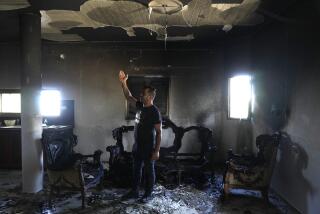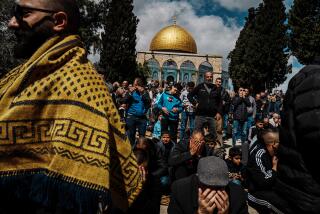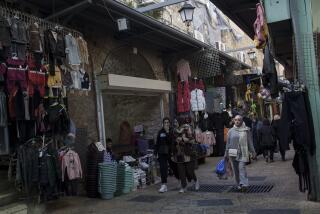Curfew Quiets Troubled Town on West Bank
- Share via
RAMALLAH, Israeli-Occupied West Bank — The center of this largely Christian Arab town 10 miles north of Jerusalem remained under a controversial 24-hour curfew Friday, six days after a West Bank Jewish settler was killed in the Ramallah market.
Rolls of barbed wire blocked the streets and soldiers turned back pedestrians at a point about two blocks from the spot where Zalman Abulnik, a 52-year-old immigrant from the Soviet Union and an employee of the Israeli occupation authority, was shot in the head at close range while shopping last Sunday.
A curfew was imposed within hours of the killing, and the army warned that anyone violating it might be shot on sight.
Meanwhile, Abulnik’s neighbors from the Jewish settlement of Hadasha continued a mourning vigil at the site from sunup to sundown. The armed settlers intend to stay for the traditional seven days of mourning, and an army spokesman said the curfew will remain in effect until they leave.
“There’s nothing we can do about them,” an Israeli military source said.
‘Collective Punishment’
The army limited the curfew on Thursday after a protest by the Assn. for Civil Rights in Israel. “In a state that honors the rule of law,” the association said in a cable to Defense Minister Yitzhak Rabin, “there is no justification for a reaction that cannot be seen as anything but collective punishment of thousands of people whose normal lives have been upset for several days.”
Until Thursday, when the size of the affected area was reduced, the curfew extended to the city limits of both Ramallah and neighboring El Bireh. The reduced curfew area still encompasses the central Ramallah shopping district.
Two months ago, an Israeli reservist was killed under similar circumstances a few hundred yards from the spot where Abulnik was slain. The Democratic Front for the Liberation of Palestine, a Marxist group supported by Syria, among others, has taken responsibility for both killings.
The curfew was lifted for an hour on Tuesday so residents could shop for food and other necessities. And the security forces allowed one other major exception to the curfew--when hundreds of residents participated Wednesday in the funeral of former Ramallah Mayor Karim Khalaf, who died of a heart attack a week ago.
Mourning Notices
The settlers have parked a yellow van a few feet from the place where Abulnik fell and have put a large Israeli flag in a stand next to it. On the wall of a shuttered shop, they have posted black-bordered death notices reading: “With grief, agony, and anger, we are mourning the murder of our dear friend.”
“He was murdered because he was a Jew, so we Jews are coming here,” said Naom Kaplan, 51, a physics professor at Hebrew University and a neighbor of the dead man. “It is a warning in a sense.”
Asked about the civil rights group’s charge that the curfew constitutes collective punishment of the city’s Arab population, Kaplan said there are differences among the Jewish settlers over the move. However, he added: “In my view, one should do much more severe collective punishment. . . . Every time an Israeli citizen is killed because he is a Jew, (the government) should put a settlement in that place.”
Elyakim Haetzni, a lawyer and leader of the West Bank settlement movement, called curfews the “blind vengeance of a mindless giant that has been bitten by a mosquito and doesn’t know what to do about it.”
“What we are demanding,” he said, “is that the authorities hit at the head of the snake--the (West Bank) universities and the (Palestinian) refugee camps. The authorities have lists of the people sending the killers and the gasoline bombers. We demand that they be deported, that the universities be closed.”
More to Read
Sign up for Essential California
The most important California stories and recommendations in your inbox every morning.
You may occasionally receive promotional content from the Los Angeles Times.









